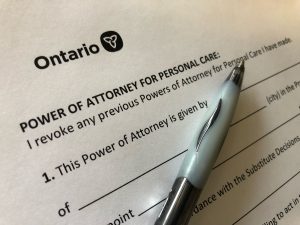10.2 Substitute Decision Maker & Power of Attorney for Personal Care
VIDEO: Advance Care Planning
This short video provides a quick overview of Advanced Care Planning and choosing a Substitute Decision Maker.
As part of advanced care planning, it is important to appoint in writing one or more Substitute Decision Maker(s) (SDM) via a Power of Attorney for Personal Care (POAPC). In Ontario, a SDM is referred to as an Attorney for Personal Care (APC) (Dying with Dignity Canada, 2021). A POAPC is a legal document that identifies your substitute decision maker(s) and gives them the legal power to make health and medical decisions on your behalf when you are unable to do so yourself. An SDM/APC is a person (or more than one person) who you authorize through a POAPC to speak for you when you are unable to do so (Advanced Care Planning, n.d.).
As SDMs/APCs have the responsibility to make future health and medical decisions for you, it is important they have a clear understanding of your values and wishes to help guide their decisions (Advanced Care Planning, n.d.). Conversations about end of life and death, as well as your values and wishes around illness and end of life, with your loved ones are essential. These conversations not only help you to assist the people around you to understand the types of care you would/would not want in certain situations., they can also help you identify the person(s) most likely to honour your wishes. The person(s) you choose to be your substitute decision maker(s) should be people “who know you well, will respect your beliefs or values, and who you trust to carry out your wishes” (Dying with Dignity Canada, 2021).

Click the links below to learn more about selecting an SDM. The third link is to a document that helps you to lay out your advanced care directives and select an SDM/APC (The completion of this document is the basis of the assignment for this Chapter):
Engaging in Advanced Care Planning for COVID-19

